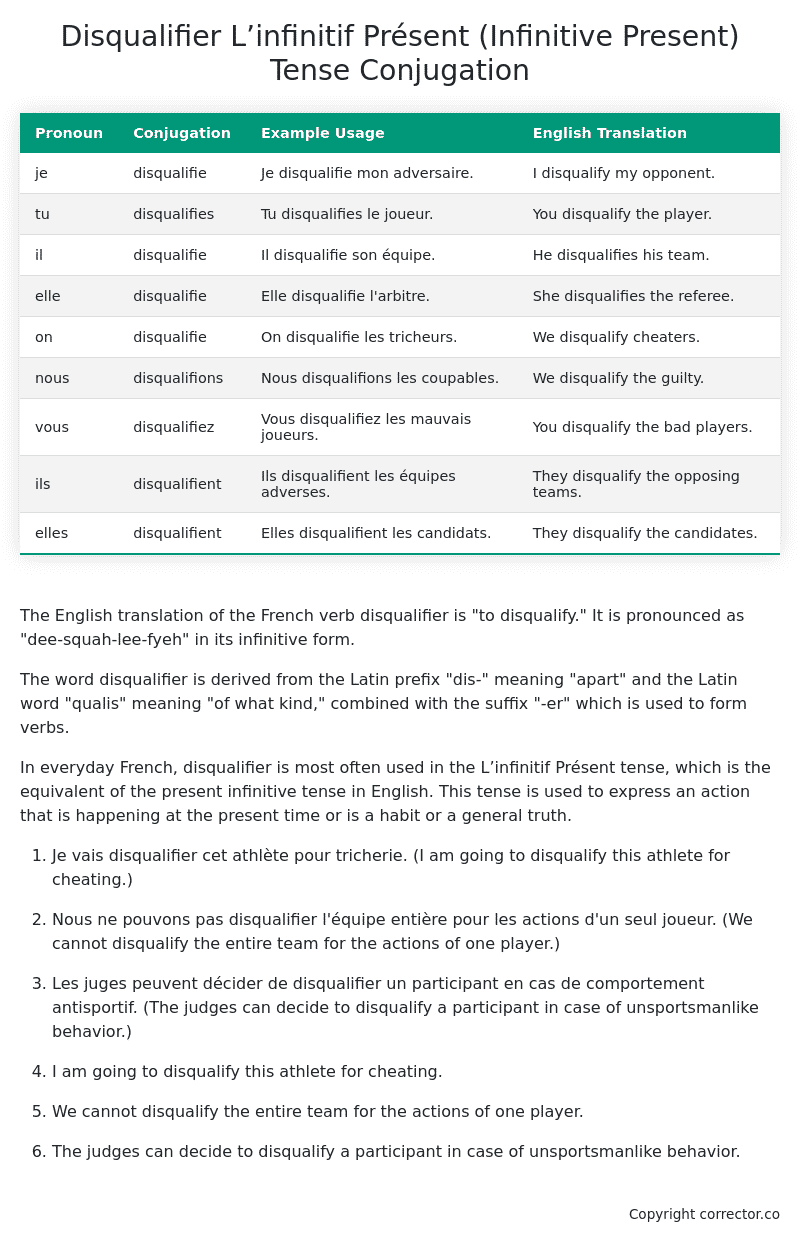L’infinitif Présent (Infinitive Present) Tense Conjugation of the French Verb disqualifier
Introduction to the verb disqualifier
The English translation of the French verb disqualifier is “to disqualify.” It is pronounced as “dee-squah-lee-fyeh” in its infinitive form.
The word disqualifier is derived from the Latin prefix “dis-” meaning “apart” and the Latin word “qualis” meaning “of what kind,” combined with the suffix “-er” which is used to form verbs.
In everyday French, disqualifier is most often used in the L’infinitif Présent tense, which is the equivalent of the present infinitive tense in English. This tense is used to express an action that is happening at the present time or is a habit or a general truth.
-
Je vais disqualifier cet athlète pour tricherie. (I am going to disqualify this athlete for cheating.)
-
Nous ne pouvons pas disqualifier l’équipe entière pour les actions d’un seul joueur. (We cannot disqualify the entire team for the actions of one player.)
-
Les juges peuvent décider de disqualifier un participant en cas de comportement antisportif. (The judges can decide to disqualify a participant in case of unsportsmanlike behavior.)
-
I am going to disqualify this athlete for cheating.
-
We cannot disqualify the entire team for the actions of one player.
-
The judges can decide to disqualify a participant in case of unsportsmanlike behavior.
Table of the L’infinitif Présent (Infinitive Present) Tense Conjugation of disqualifier
| Pronoun | Conjugation | Example Usage | English Translation |
|---|---|---|---|
| je | disqualifie | Je disqualifie mon adversaire. | I disqualify my opponent. |
| tu | disqualifies | Tu disqualifies le joueur. | You disqualify the player. |
| il | disqualifie | Il disqualifie son équipe. | He disqualifies his team. |
| elle | disqualifie | Elle disqualifie l’arbitre. | She disqualifies the referee. |
| on | disqualifie | On disqualifie les tricheurs. | We disqualify cheaters. |
| nous | disqualifions | Nous disqualifions les coupables. | We disqualify the guilty. |
| vous | disqualifiez | Vous disqualifiez les mauvais joueurs. | You disqualify the bad players. |
| ils | disqualifient | Ils disqualifient les équipes adverses. | They disqualify the opposing teams. |
| elles | disqualifient | Elles disqualifient les candidats. | They disqualify the candidates. |
Other Conjugations for Disqualifier.
Le Present (Present Tense) Conjugation of the French Verb disqualifier
Imparfait (Imperfect) Tense Conjugation of the French Verb disqualifier
Passé Simple (Simple Past) Tense Conjugation of the French Verb disqualifier
Passé Composé (Present Perfect) Tense Conjugation of the French Verb disqualifier
Futur Simple (Simple Future) Tense Conjugation of the French Verb disqualifier
Futur Proche (Near Future) Tense Conjugation of the French Verb disqualifier
Plus-que-parfait (Pluperfect) Tense Conjugation of the French Verb disqualifier
Passé Antérieur (Past Anterior) Tense Conjugation of the French Verb disqualifier
Futur Antérieur (Future Anterior) Tense Conjugation of the French Verb disqualifier
Subjonctif Présent (Subjunctive Present) Tense Conjugation of the French Verb disqualifier
Subjonctif Passé (Subjunctive Past) Tense Conjugation of the French Verb disqualifier
Subjonctif Imparfait (Subjunctive Imperfect) Tense Conjugation of the French Verb disqualifier
Conditionnel Présent (Conditional Present) Tense Conjugation of the French Verb disqualifier
Conditionnel Passé (Conditional Past) Tense Conjugation of the French Verb disqualifier
L’impératif Présent (Imperative Present) Tense Conjugation of the French Verb disqualifier
L’infinitif Présent (Infinitive Present) Tense Conjugation of the French Verb disqualifier (this article)
Struggling with French verbs or the language in general? Why not use our free French Grammar Checker – no registration required!
Get a FREE Download Study Sheet of this Conjugation 🔥
Simply right click the image below, click “save image” and get your free reference for the disqualifier L’infinitif Présent tense conjugation!

Disqualifier – About the French L’infinitif Présent (Infinitive Present) Tense
Forming the Infinitive Present
Common Everyday Usage Patterns
As a Verb’s Dictionary Form
After Modal Verbs
As an Imperative
In Infinitive Clauses
Interactions with Other Tenses
Present Tense
Future Tense
Conditional Tense
Passé Composé
Imperfect Tense
Subjunctive and Conditional Moods
Summary
Want More?
I hope you enjoyed this article on the verb disqualifier. Still in a learning mood? Check out another TOTALLY random French verb conjugation!


